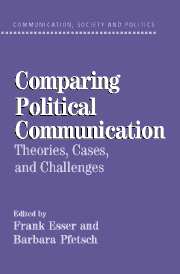Book contents
- Frontmatter
- Contents
- Contributors
- Comparing Political Communication
- INTRODUCTION
- I THEORIES AND METHODS
- II CASES
- III PERSPECTIVES AND CHALLENGES
- 14 State of the Art of Comparative Political Communication Research: Poised for Maturity?
- 15 From Political Culture to Political Communications Culture: A Theoretical Approach to Comparative Analysis
- 16 Problems of Comparative Political Communication Research: Culture as a Key Variable
- 17 Meeting the Challenges of Global Communication and Political Integration: The Significance of Comparative Research in a Changing World
- Author Index
- Subject Index
- References
14 - State of the Art of Comparative Political Communication Research: Poised for Maturity?
Published online by Cambridge University Press: 24 November 2009
- Frontmatter
- Contents
- Contributors
- Comparing Political Communication
- INTRODUCTION
- I THEORIES AND METHODS
- II CASES
- III PERSPECTIVES AND CHALLENGES
- 14 State of the Art of Comparative Political Communication Research: Poised for Maturity?
- 15 From Political Culture to Political Communications Culture: A Theoretical Approach to Comparative Analysis
- 16 Problems of Comparative Political Communication Research: Culture as a Key Variable
- 17 Meeting the Challenges of Global Communication and Political Integration: The Significance of Comparative Research in a Changing World
- Author Index
- Subject Index
- References
Summary
This chapter attempts an assessment of the current status of comparative political communication research. Its core concept is maturity. Comparative approaches to political communications, albeit promising and sometimes impressive, can seem ragged when compared, say, with the solidity of their application in other social sciences (e.g., sociology and political science). Our central point is that the quality of comparative research can vary not only in scientific rigor but also, and perhaps more importantly, in its ability to reveal fundamental and broadly influential features of the structures and cultures of the societies being examined. Our concern throughout this chapter therefore is that of how to recognize and to achieve such maturity in the subfield of comparative political communication scholarship.
In fact, this is our third attempt to take stock of the “state of the art” of comparative political communication research. In the first such effort, more than a quarter century ago (Blumler and Gurevitch 1975) we depicted comparative political communication research as a “field in its infancy.” The dominant tone was one of uncertainty, illustrated by the opening paragraph of the essay:
Writing in 1975, nobody could claim to be able to paint an assured portrait of the field of investigation to be described in this essay. It is not merely that few political communication studies have been mounted with a comparative focus. More to the point, there is neither a settled view of what such studies should be concerned with, nor even a firmly crystallized set of alternative options for research between which scholars of diverse philosophic persuasions could choose.
- Type
- Chapter
- Information
- Comparing Political CommunicationTheories, Cases, and Challenges, pp. 325 - 343Publisher: Cambridge University PressPrint publication year: 2004
References
- 46
- Cited by



